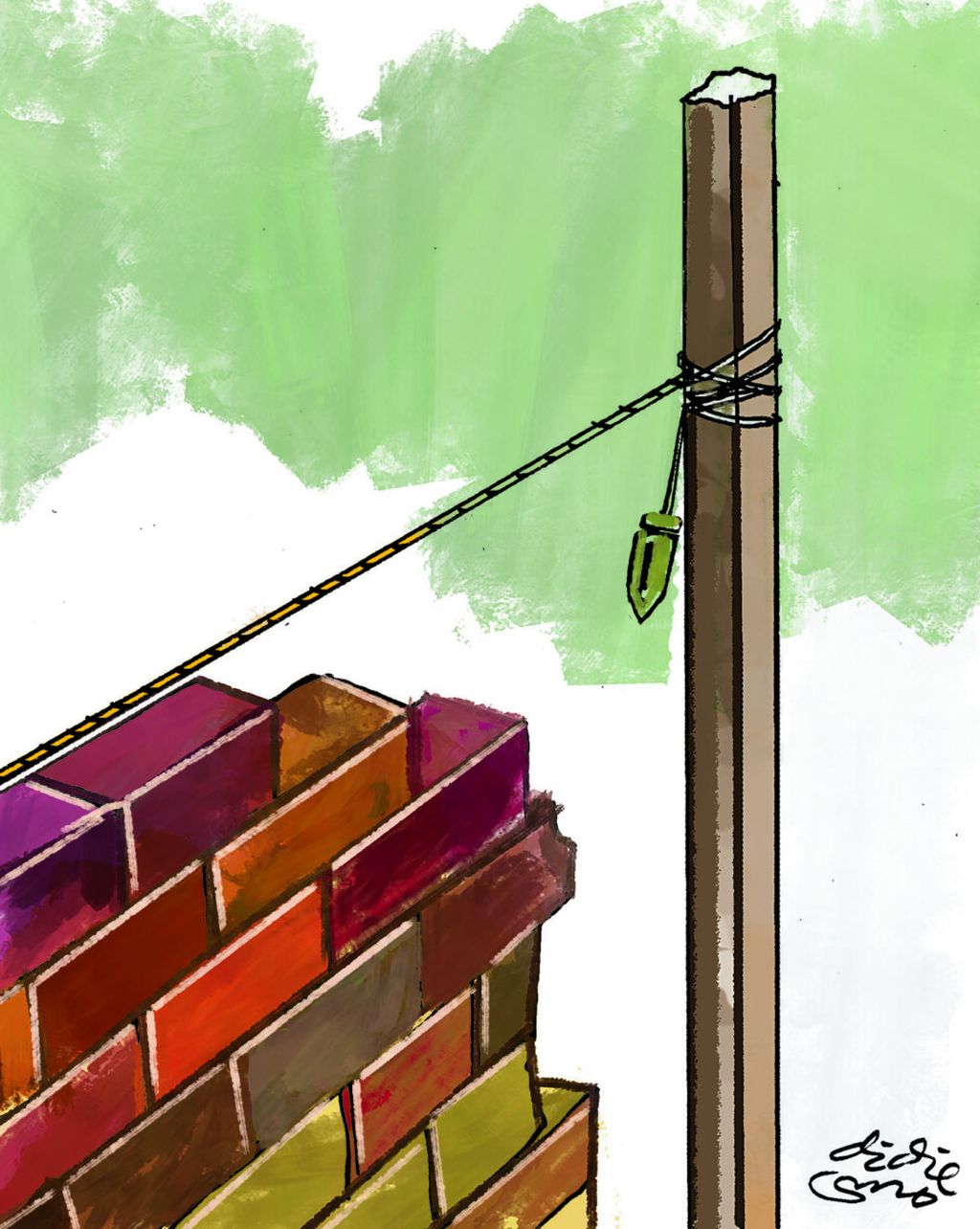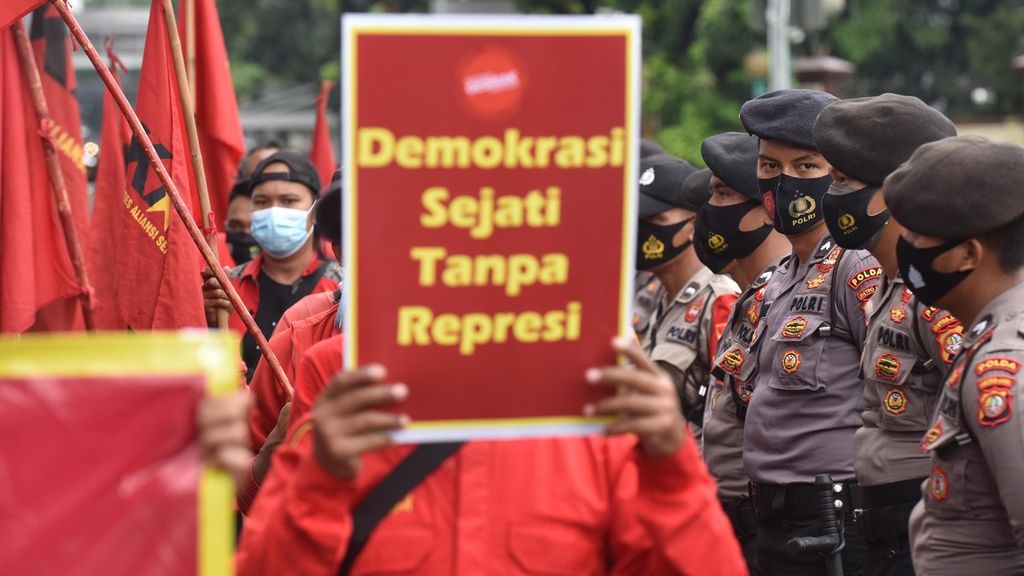Criticism and Retrogression of Democracy
Kompas (15/2/2021) published an interesting report titled “Preserve the Ecosystem of Democracy”.

Kompas (15/2/2021) published an interesting report titled “Preserve the Ecosystem of Democracy”. The news is relevant, eliciting our awareness of the necessity of protecting freedom of expression as one of the human rights in a democratic country.
Today the sign of retrogression of democracy is appearing and firming up. In the Great Dictionary of the Indonesian Language (KBBI), retrogresi (retrogression) is defined as a setback, deterioration, decline. Terminologically, retrogression of democracy refers to a quality setback in democracy resulting from the loss of sensitiveness and commitment to respect the law and civility.
The quality of public discourses in various channels reflects a paradox. Many members of the political elite and their supporters are unprepared, with criticism marginalizing dialectics and revealing shallow group reasoning.
Ecosystem of democracy
Abounding information gives rise to the dark side of opinion war in different time lines of social media. Sadly, netizens’ discussions mostly fail to refer to emancipatory reasoning and public interests, but instead more to personal and group sentiments that often end in reporting each other to the police in the name of violation of the law, such as Law No. 19/2016 on Electronic Information and Transactions (ITE Law).
Cyber harassment, persecution, doxing and character assassination involving buzzers are getting rampant. In fact, dissenting views and criticism are badly needed to build a sound ecosystem of democracy.
President Joko “Jokowi” Widodo has several times mentioned the important function of criticism. Speaking at the climax of the 2021 National Press Day commemoration at the State Palace on 9 February, the President asked the press to offer criticism and suggestions to the government. Likewise, when addressing the Indonesian Ombudsman Year-End Report program on 8 February 2021, the President called on the public to more actively convey criticism of the potential for maladministration on the part of public officials.
Also read: Political Party Reform
On another occasion, in his speech before the joint session of the House of Representatives and the Regional Representatives Council at the Nusantara Building on 16 August 2018, President Jokowi stressed the importance of a favorable ecosystem of democracy and a stable condition of security.
Like nature, the ecosystem constitutes a system of ecology formed on a mutual basis between living creatures and their environment. The same is true of the ecosystem of democracy, in which many factors should be preserved to make them contributive, sound and sustainable. Some examples are the processes of elections and pluralism, the function and performance of the government, political participation, political culture, and certainly civil liberties.
The EIU classifies countries into four categories of regimes: full democracy, flawed democracy, hybrid regime and authoritarian regime.
The report of The Economist Intelligence Unit (EIU) on the 2020 democracy index should serve as a lesson for Indonesia. Our democracy index declined from 6.48 to 6.3 and Indonesia ranked 64th out of 167 countries in the world. This has been the lowest rate scored by Indonesia over the last 14 years. Indonesia was categorized as a country with flawed democracy. The EIU classifies countries into four categories of regimes: full democracy, flawed democracy, hybrid regime and authoritarian regime.
What is interesting to note for evaluation is that the EIU gave the score 7.92 to the processes of elections and pluralism. Meanwhile, the government’s function and performance scored 7.50, political participation 6.11, political culture 4.38 and civil liberties 5.59. The scores indicate that the eye-catching factors are of course political culture and civil liberties with their low rates.
/https%3A%2F%2Fkompas.id%2Fwp-content%2Fuploads%2F2020%2F12%2F20201229ags152_1609244524.jpg)
A resident crosses a mural criticizing the corruptors in Jatisampurna, Bekasi City, on Tuesday (29/12/2020).
The effort to strengthen and solidify civil liberties is fundamental. The government and society should make it a joint working agenda rather than just cosmetic rhetoric. There should be concrete protection for freedom of expression in the true sense of the word. Particularly Article 28 E Paragraph 3 of the Constitution of 1945 clearly and explicitly stipulates that “every citizen shall have the right to freedom of association, assembly and expression”.
Freedom paradox
Some important data and notes from various agencies are worthy of serious examination. Records from the Commission for Missing Persons and Victims of Violence (Kontras) until October 2020 mentioned 10 incidents and 14 people under legal proceedings for criticizing President
Jokowi. Moreover, there were 14 incidents with 25 people under proceedings for criticizing the National Police (Polri) and four other cases with four people under proceedings for criticizing regional administrations. They were subjected to proceedings by means of Polri’s telegrams as well as the ITE Law.
Also read: Digital Ecosystem not yet Established
Freedom House (FH) has released its research results showing the worsening quality of internet freedom in Indonesia. Quoted from freedomhouse.org, Indonesia’s internet freedom in 2019 earned the value of 51 on a scale of 0-100, while in 2020 the value dived to 49.
Criminalization affected journalists, activists and other elements of civil society criticizing local government policies.
Among the several factors causing the decline were intimidation and doxing of activists and journalists. The hacking of social media accounts of prodemocracy activists and critics of government policies amid the Covid-19 pandemic was on the rise in 2020. Criminalization affected journalists, activists and other elements of civil society criticizing local government policies.
Results of an Indonesian Political Indicator survey conducted from 24 to 30 September 2020 confirmed the perceptions arising in public. The opinion poll involving 1,200 respondents with a credibility rate of 95 percent found 21.9 percent of residents very fearful of expressing views and 47.7 percent somewhat fearful of doing so.
The latest case needing some notes is the report of Din Syamsuddin submitted by the Anti Radicalism Movement (GAR) of the Bandung Institute of Technology (ITB) to the State Civil Service Commission (KASN) and the State Personnel Agency (BKN). If all lecturers of state colleges in their writings and public discussions criticize the government, are they regarded as committing a violation because of their position as civil servants? Intellectuals have the right to make critical reasoning as a reflection of their academic standpoint, as long as it is based on rational thoughts that can be tested and data that can be accounted for.
If they go beyond limits such as provoking treason, making hate speech in the name of ethnicity, religion, race, group, sexual orientation or disabled group, they are liable to legal proceedings to be held responsible.
For the case of Din Syamsuddin, Coordinating Political, Legal and Security Affairs Minister Mahfud MD has affirmed that the government will not take any legal action against Din. It was an evident stance communicated to the public and worthy of appreciation, otherwise prejudice would have directly or indirectly arisen against the government.
Improvement notes
At least two things require improvement. First, which is structural, concerns the state apparatus and legal products. Law enforcement personnel like the police should be impartial. There should be no tendency toward injustice in enforcing the law, especially if it’s seen by the public as discrimination in treating pro-power and contra-power groups. Moreover, various catchall articles that can prosecute people due to their flexible interpretations need proper evaluation and control.
Also read: Safeguarding Good Governance
One of them is Article 27 Paragraph 3 of Law No.19/2016. This article imposes a ban on anybody who purposely and unlawfully distributes and/or transmits and/or enables access to electronic information and/or electronic documents with insult and/or defamation content. Such a provision can offer an easy entry to certain people or groups to prosecute other people in the name of insults and defamation.

Workers rallied in front of the National Police Headquarters, Jalan Trunojoyo, South Jakarta, Friday (6/11/2020). They criticized the police\'s repressive actions when securing demonstrations against the Omnibus Law on the Job Creation Law in Jakarta and a number of regions in Indonesia.
Second, it’s the role to be played by those serving as gatekeepers as well as anchors of citizens’ communication, such as people or institutions behind the operation of buzzers. Political and social responsibility should be made a tradition. Narrations and counter narrations should be based on arguments and data, instead of methods that kill the messenger! Dealing blows by any means directed at character assassination will make the criticism and debate tradition in public spaces vanish.
Mark Poster in his article, Cyberdemocracy: Internet and the Public Sphere (1995), offers the optimism that online media can turn into the hope for the availability of a new public sphere that will provide a situation of communication without domination. However, the hope can be a utopia and will never be realized if critics are totally invaded by the troop of buzzers without heeding ethics and laws by hiding in the dark room of the cyber world. This is even more the case if they get special treatment from the state apparatus. Just let narrations be countered by narrations, data by data, let arguments work in the room of dialectics. The ecosystem of democracy should be maintained together by all.
/https%3A%2F%2Fkompas.id%2Fwp-content%2Fuploads%2F2019%2F10%2FDSC00027.JPG_1570711881.jpeg)
Gun Gun Heryanto
Gun Gun Heryanto, Executive Director, The Political Literacy Institute; Lecturer of Political Communication, State Islamic University Jakarta
(This article was translated by Aris Prawira)